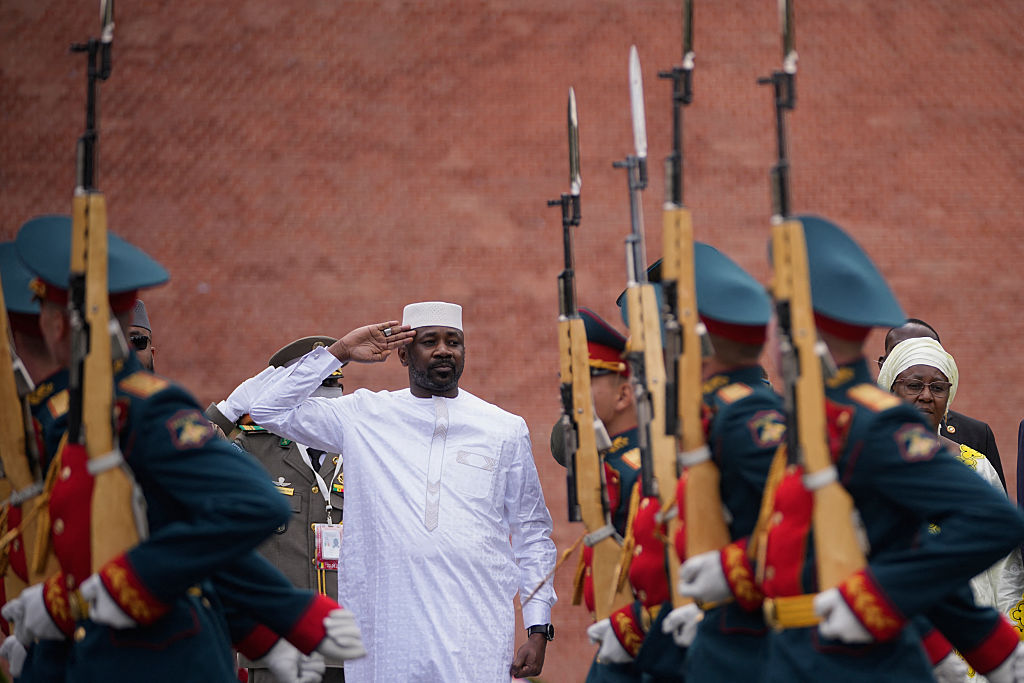Up to 55 Malian soldiers, including two generals, were arrested on August 14 and accused of attempting to overthrow Col. Assimi Goïta’s military junta. Among those arrested were Gen. Abass Dembele, former governor of the Mopti region, and Gen. Nema Sagara, one of the highest-ranking female officers in Mali’s Air Force.
Dembele was dismissed in May when he demanded an investigation into allegations that the Malian Army had killed civilians in the village of Diafarabe. Sagara was lauded for her role in fighting rebel groups in 2012.
Gen. Daoud Aly Mohammedine, Mali’s security minister, said the alleged plot began on August 1 and that a French national, Yann Vezilier, was involved and detained. France’s Foreign Ministry denied Vezilier’s involvement.
Analysts at the Robert Lansing Institute for Global Threats and Democratic Studies say the foiled coup plot indicates internal fractures within the ruling military junta.
“If credible coup plots are emerging, it means dissatisfaction has reached even the military elite, not just civilians or opposition politicians,” the institute’s analysts said in a new report. “The fact that the alleged conspirators include a respected officer and former governor indicates serious dissent from experienced figures rather than a fringe rebellion.”
The foiled coup plot unfolded as the junta works to tighten its grip on power. Goïta’s government has promised a return to democracy but has repeatedly refused to hold elections. In May, the junta outlawed and dissolved all political parties. About a month before the alleged coup plot was uncovered, Goïta was granted a five-year presidential term by Mali’s transitional parliament. The term is renewable without elections.
Every coup attempted in Mali “erodes trust inside the armed forces and forces Goïta to rely more heavily on a narrow loyalist circle, making him politically isolated,” the report said.
Lansing Institute analysts noted that the alleged coup attempt happened amid instability in Burkina Faso and Niger, where military juntas face legitimacy crises similar to Mali’s. A successful coup by any of these countries “could inspire or trigger moves in another,” the institute reported.
Since Goïta ordered French troops to leave the country in 2022, Mali has leaned on Russian mercenaries for security support. A report by The Sentry shows that this support is beginning to crumble. There is growing frustration among Malian Army personnel toward the Russians, whom the Malians blame for operational mistakes resulting in the loss of equipment and personnel, and of disrespecting the command-and-control structure.
The report is based on interviews with officials from Mali’s military, intelligence agency, finance and other ministries. Malian troops said their Russian colleagues are given preferential treatment, prioritized in the event of medical evacuations and equipment, and are paid better. Malian forces and Russian fighters are accused of committing atrocities against civilians.
“There has been a significant increase in attacks on civilians and in civilian casualties since [Russian mercenaries arrived] in Mali, and this, in turn, has severely undermined relations between the Malian military and the Malian public,” the report said.
Civilians also are angry over rising food prices, reduced international aid, disrupted trade and failures to subdue jihadist groups. Goïta’s junta cited defeating terrorists as justification for its August 2020 coup.
On July 1, the Jama’at Nusrat al-Islam wal-Muslimin (JNIM) terror group attacked seven Malian military posts in a series of coordinated, simultaneous early morning assaults on urban centers and towns. Mali’s Army claimed that it killed 80 terrorists, while JNIM, which is affiliated with al-Qaida, claimed that it killed dozens of soldiers and destroyed more than 100 military vehicles and motorcycles.
JNIM retaliated by establishing blockades in the city of Kayes and Niono town, where it seized weapons and declared civilians were legitimate targets in the Kayes and Ségou regions.
“These incidents demonstrate [JNIM’s] ambition to threaten Mali’s revenue sources and industrial capability,” the Armed Conflict Location & Event Data project (ACLED) reported. “The group is progressively consolidating its presence in the Ségou and Kayes regions and exploiting the mountainous corridor between Sikasso and Bobo-Dioulasso to hide and coordinate the operations between Burkina Faso and Mali.”
On August 19, JNIM attacked Malian Army positions in Farabougou and Biriki-Were in the Ségou region, causing “numerous casualties among both military personnel and civilians,” according to the African Union.

